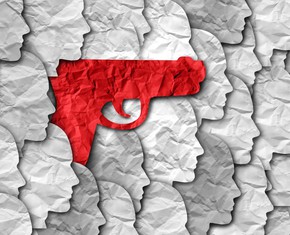The views expressed in our content reflect individual perspectives and do not represent the authoritative views of the Baha'i Faith.
As a Black millennial, I feel like I’ve spent my entire life talking about the n-word. I can reflect on many conversations with different non- Black people about why it’s not okay for them to say it. It’s hard to tell what is worse- when the person that uses it is someone that I consider a friend or a famous artist whose art I admire.
I’m sure this happens every day, but sometimes it makes the news. To list just a few instances, there was the recording of the mostly white cast of the Victoria’s Secret fashion show singing Cardi B’s “Bodak Yellow” without omitting the n-word when Cardi says she’s “quick to cut a n*gga off.” Then, there was the cosmetics company that decided to name their black nail polish “Thick As A N*gga.” More recently, Russian designer Ulyana Sergeenko addressed a note “to my n*ggas in Paris” to blogger Miroslava Duma during Paris Couture Week, which Duma then posted on her social media.
Since these three stories are somewhat contained to the fashion world, it’s easy to point a finger at the industry. In reality, it is naive for criticism to solely be contained to a specific field. To criticize the part without also criticizing the whole fails to recognize that racism is an epidemic that doesn’t discriminate. White supremacy touches all industries at all levels.
There is an overarching theme of the people using the n-word not seeing any problem with its usage. There is a level of ignorance of its history and their relationship to it. Language carries so much meaning, and words hold incalculable power.
He must never seek to exalt himself above any one, must wash away from the tablet of his heart every trace of pride and vain-glory, must cling unto patience and resignation, observe silence and refrain from idle talk. For the tongue is a smoldering fire, and excess of speech a deadly poison. Material fire consumeth the body, whereas the fire of the tongue devoureth both heart and soul. The force of the former lasteth but for a time, whilst the effects of the latter endureth a century. – Baha’u’llah, Gleanings from the Writings of Baha’u’llah, p. 264-265.
One word may be likened unto fire, another unto light, and the influence which both exert is manifest in the world. Therefore an enlightened man of wisdom should primarily speak with words as mild as milk, that the children of men may be nurtured and edified thereby and may attain the ultimate goal of human existence which is the station of true understanding and nobility. And likewise He saith: One word is like unto springtime causing the tender saplings of the rose-garden of knowledge to become verdant and flourishing, while another word is even as a deadly poison. It behoveth a prudent man of wisdom to speak with utmost leniency and forbearance so that the sweetness of his words may induce everyone to attain that which befitteth man’s station. – Baha’u’llah, Tablet of Maqṣúd, p.173.
Baha’u’llah talks about the dangers of hateful speech, equating it to poison thats effects can be felt for a century. Words can be used to oppress or to liberate. We saw oppression through language during slavery, when white kidnappers would stop enslaved Africans from speaking their native languages, as well as preventing them from learning how to read or write English. Today, Black people use language as a means to achieve freedom through art, poetry and hip hop. Even speaking in Ebonics and not prescribing to “proper” English is a form of resisting white supremacy through our words.
Non-Black people using the n-word is blatant racism, and displays a level of privilege that allows one to disregard the voices of all Black people who have pointed this out to be inappropriate. It’s pretty easy to identify why this is problematic. Since the slur was used to oppress Black people historically, Black people get to take ownership of the word. If a Black person feels comfortable saying it, it’s completely different than a white person saying it, because the cultural relationship to the word is extremely different.
There must be an acknowledgement that racism is woven into the fabric of our society, and Black people are treated like second class citizens because of it. This framework creates a dynamic that values the voices of white people over everyone else, which is why white people play a specific role at the forefront of dismantling racism:
Let the white make a supreme effort in their resolve to contribute their share to the solution of this problem, to abandon once for all their usually inherent and at times subconscious sense of superiority to correct their tendency towards revealing a patronizing attitude towards the members of the other race, to persuade them through their intimate, spontaneous and informal association with them of the genuineness of their friendship and the sincerity of their intentions, and to master their impatience of any lack of responsiveness on the part of a people who have received, for so long a period, such grievous and slow-healing wounds. – Shoghi Effendi, The Advent of Divine Justice, pp. 40.
Proximity to whiteness, material wealth, and social clout can act like barriers that make people subconsciously think they don’t need to be empathetic towards certain groups of people until after they’re called out on their insensitivity. Even then, many of the apologies issued by people who have been caught using racial slurs are lacking in genuine remorse, sincerity, or commitment to self-education.
Language is a vehicle of culture, and reflects the values of society. It tells the story of history in real time, and shows how equitable a culture is. It’s important to be acutely aware of the language we use, because a lot of the time we use words that have a totally different impact than intended. There are also other words in English that are similarly rooted in racism, but not so obviously. Phrases like the “peanut gallery” and “master bedroom” are embedded in our vernacular thanks to racism.
The peanut gallery refers to the cheap seats in a theater, the only seats available to Black people back in the 1920’s, with peanuts being one of the cheapest snacks at performances. This was a way to insult the wealth of a Black person back in the day. Today, even though some would argue that the meaning of the phrase has changed, and they don’t mean to be racist or insensitive when they say it, the word still carries a less than desirable connotation, and is rooted in racism.
Similarly, we often call the biggest bedroom in a house the “master bedroom.” Why is this? Back in the day, the person sleeping in said room would have been the “master” to enslaved people on a plantation. To this day we still use that language, even though slavery technically doesn’t exist anymore. This is another example of how the impact and weight of someone’s words can be extremely different than the intended meaning.
These are small but poignant examples of how everyday words perpetuate subconscious racism. This, unfortunately, translates into our actions as well. Well intentioned people do racist things all the time, because we have been socialized that racism, specifically perpetuated by white people, is normal.
Shoghi Effendi, more than 80 years ago in The Advent of Divine Justice, called on white people to make the supreme effort in actively educating themselves on the ways in which they are a part of this vicious cycle. White people should be heavily involved in conversations on how to achieve race unity. This includes being aware and critical of language that contributes to racism.
Once you know that the history of a word or practice is tainted by racism, there becomes no excuse for complacency. There is power in the individual voice, and we chose every day what messages we want to send. Communication is inherent to humans, but racism isn’t. It’s incredibly important that we work to unveil both blatant and hidden prejudice from our language.
















Comments
Sign in or create an account
Continue with Googleor